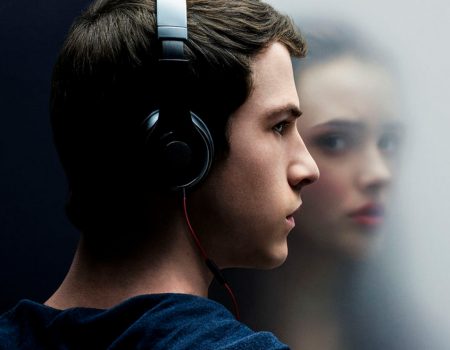Dylan Minnette as Clay Jensen and Katherine Langford as Hannah Baker in the Netflix series "Thirteen Reasons Why" ©2017 Netflix
The response to my blog about the Netflix series, Thirteen Reasons Why, has been pretty overwhelming.
Whether you agreed with my views or challenged them, I want to thank you for being part of the dialogue about the content of this series. As many of you have said, having the conversations about the very real issues raised in Thirteen Reasons Why, no matter how painful or difficult, is so important.
The variety of perspectives contained in the comments has been almost universally informative, often supportive, and occasionally, pretty tough to read.
I want to thank the people who said that this series was helpful to them and that it was validating to their struggles in the world. I'm grateful to those who made themselves vulnerable and told their stories, no matter how painful. I also want to thank my colleagues who weighed in: both those who agreed with me and those who didn't. I appreciated all of the honest feedback from young people who commented, especially those who have experienced struggles similar to Hannah's. Your strength and resilience is powerful and inspiring. I offer my condolences to all who have experienced the heartbreak of suicide. And finally, I want to thank all of you fellow parents for weighing in as we navigate the challenges of modern parenting together.
I'm thankful for the dialogue to which my blog may have, in its own way, contributed. However, in reading many of your comments, it became clear that more than a few of you interpreted some of my words to mean that I "blame the victim". I was not. Victim-blaming is never ok, so I'll attempt to clarify here.
In my statement, "I believe we should teach our children to dig deep and find resilience, not point fingers at others and hold them responsible for our feelings and actions", I did not mean that those who have experienced trauma don't have the right to feel whatever feelings their trauma has caused them: fear and anxiety, anger and rage, sadness and disillusionment, shame and guilt, hopelessness, or grief....all of those feelings are common and understandable responses to trauma that victims have every right to feel.
With my patients who have experienced trauma, no matter what the cause, or how deeply painful the psychological wound may be, I work with them to help them see that we all have the power within us to cope, and even to heal, and that power is often stronger than we might know. Sometimes, we need help from someone, often a therapist, to tap into it. That healing is a process, and comes with work, and with time. When it happens, the trauma victim is able to release pain, and reclaim their personal power. And in taking that power back, they can decide, strengthened by their newfound resilience, which feelings they aren't ready to let go of, and which ones they are ready to release. In that transition, the person processing the trauma goes from victim to survivor.
I would have loved to have seen Hannah going through her own process of finding her power again, in the face of all the horrors she experienced.
As many of you have pointed out, teens face a plethora of painful and traumatic events that span a large spectrum of aggression -- many of them accurately depicted in the series. The conversation with our teens that I hoped my blog post could help facilitate would be that they are strong and empowered to take on -- and get past -- even the most painful and difficult things. And above all, that they are loved.
So, thank you for reading, and for talking. I am so happy that the series and my blog have sparked dialogue around the issues of mental health and suicide. Since this is my life’s work and passion, I crave healthy conversations, especially with our kids, around these issues. Parents and others with concerns, I encourage you to know the signs of suicide risk.
I continue to recommend that if you choose to allow your child to watch the series (again…no judgment here. We are all in this together!), please watch it with them. Process the struggle with mental illness. If your child is struggling, help him or her find find resiliency with the help of a professional -- even if it is buried deep within.
And finally, let them know that you love them, and that suicide is never an option.
If you are in crisis, there's help available. Please call the National Suicide Prevention Lifeline at 1-800-273-TALK (8255) or contact the Crisis Text Line by texting TALK to 741-741.

